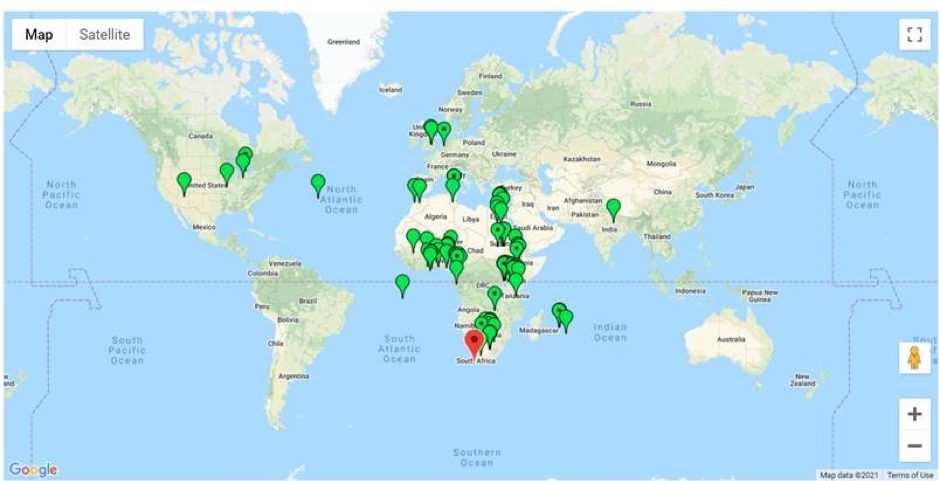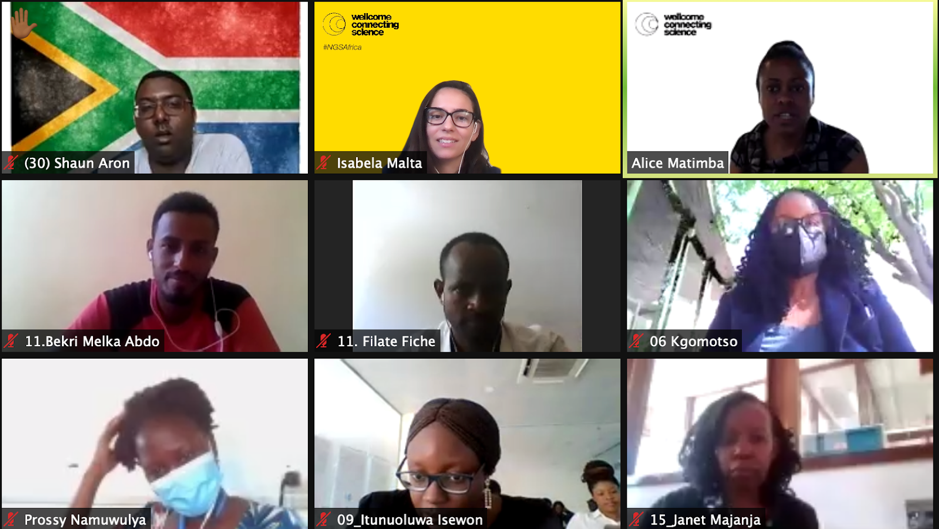Scaled Up Training Collaboration Brings Vital Genomics Skills To African Researchers
Large-scale bioinformatics training will further equip scientists with skills to help tackle major health problems such as Covid-19
Bioinformatics training is being delivered on an unprecedented scale throughout Africa to help scientists tackle some of the continent’s most urgent health challenges, thanks to a new collaboration between Wellcome Connecting Science and H3ABioNet, the Pan African Bioinformatics Network for the Human Heredity and Health in Africa (H3Africa).
The training, which is being delivered across 16 countries in person and online, will equip the participants with the skills required to analyse genetic sequencing data. This data is becoming increasingly important to tackle heritable conditions and infectious diseases such as malaria and Covid-19.

Over recent years, Next Generation Sequencing (NGS) has revolutionised research into human health and disease. The volume of genetic sequence data generated is rising rapidly each year, making it increasingly important for scientists to gain the bioinformatics skills needed to organise and analyse these data.
Targeted at researchers and healthcare professionals, the course aims to equip participants with the essential informatics skills required to begin analysing NGS data and to apply some of the most commonly used tools and resources for sequence data analysis.
The collaboration uses a distributed classroom model and a blended learning format, consisting of individual work, virtual contact sessions, online educational resources and technology platforms for delivery of training materials and practical exercises.
Expert bioinformatics trainers based in Africa, Europe and the USA deliver the lectures and develop course materials remotely. Locally, teaching assistants and system administrators support and assist participants in person or virtually. Over 2000 applications were received for the course, of which a record 415 participants were accepted. Learning is taking place in 31 classrooms across 16 countries, supported by over 100 locally-based classroom staff.
The skills acquired during the course will be applied to a wide range of health problems and research areas in Africa, from Covid-19 to rare genetic diseases.
With the emergence of new variants of SARS-CoV-2, there is a need to carry out Next Generation Sequencing (NGS) on our archived COVID-19 samples and this course will equip me with the necessary skills required for that.
Richmond Gorman, a course participant from Ghana
I am part of a newly formed Rare Disease Genomics group. Our research this year will be focused on using sequence data to identify causal variants in patients with suspected skeletal dysplasia. I have no experience in genetics and only a basic understanding of bioinformatics, so the course will provide the foundation I need to analyse the data we receive and, hopefully, begin to shed light on the causes of rare diseases such as skeletal dysplasia.
Kimberly Coetzer, a course participant from South Africa
This innovative model was developed by H3ABioNet to address logistical challenges in Africa when delivering large-scale bioinformatics training1. Leveraging the long-standing collaboration with H3AbioNet, Wellcome Connecting Science saw an opportunity to address the increasing demand for bioinformatics training via regional training networks.
The demand for training on Next Generation Sequencing (NGS) data analysis is extremely high, with over 2000 applications for this course alone. The H3ABioNet remote classroom model was an obvious choice to start to address this demand. Attendees should leave with hands on experience on NGS applied to human and pathogens, and with access to all the required software to do this at their home institution. The course will also build communities around this topic in regions that are hosting classrooms, which we hope will persist after the course for longer term support and networking.
Professor Nicky Mulder, H3ABioNet Principal Investigator and Head of the Computational Biology Division at the University of Cape Town
It is hoped that the course will provide lasting benefits not only to the participants, but also local institutions and the wider research community in Africa. This approach to capacity building and training provides an effective and sustainable model for strengthening genomic research, and promotes regional networks and communities which are critically in need of genomics skills.
This pilot project demonstrates the growing opportunities to strengthen collaborations with our regional partners. Using virtual technologies, we can offer tailored courses to more people, at low cost and with minimal travel, while amplifying the impact and capacity for genomics in Africa. We’ve delivered this course to 20 times more people than we usually could, emphasising the need to invest in agile training approaches that have allowed us to continue providing training during the Covid-19 pandemic.
Dr Alice Matimba, Overseas Courses Manager at Wellcome Connecting Science

H3ABioNet
H3ABioNet is a Pan African Bioinformatics network comprising 28 Nodes distributed amongst 17 countries, 16 of which are African. The network was developed to support H3Africa research projects through the development of bioinformatics capacity on the continent. Specifically H3ABioNet aims to: Implement a Pan African informatics infrastructure; develop an H3Africa data coordinating center; provide high quality informatics support to H3Africa and beyond; enable and enhance innovative translational research; and address outreach, development and sustainability. Training is a large component of H3ABioNet activities. Using different training modalities, we have trained over 3000 h3a people in Africa from multiple academic and professional backgrounds and on multiple topics across the spectrum of bioinformatics and genomics.
Wellcome Connecting Science
Wellcome Connecting Science’s mission is to enable everyone to explore genomic science and its impact on research, health and society.
We connect researchers, health professionals and the wider public, creating opportunities and spaces to explore genomic science and its impact on people. Connecting Science inspires new thinking, sparks conversation, supports learning and measures attitudes, drawing on the ground-breaking research taking place on the Wellcome Genome Campus.
Our Courses and Conferences team funds, develops and delivers training and conferences that span basic research, cutting-edge biomedicine, and the application of genomics in healthcare. We work with globally-renowned scientists and healthcare professionals, and run events online, on the Campus, and in regional training hubs across Africa, Asia and Latin America, that aim to educate, inspire, and transform careers.
About Wellcome
Wellcome supports science to solve the urgent health challenges facing everyone. We support discovery research into life, health and wellbeing, and we’re taking on three worldwide health challenges: mental health, global heating and infectious diseases.
